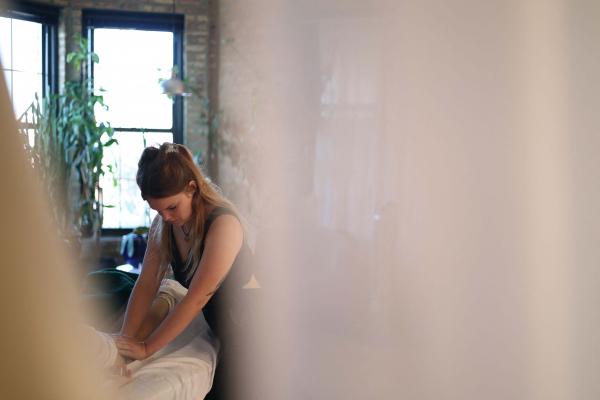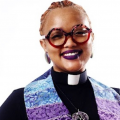I’ve been caring for the dying since I was 22 years old. Before the rise in death doula work, I was a caregiver for my mother, who died of primary peritoneal carcinoma at 58 years old. I sat with her during her chemotherapy appointments. I took notes at appointments with doctors. I created a rapport with her medical team so that I could be in the best position to advocate for her up until the very end.
After my mother took her last breath, I set out to accompany others on their journeys through life while making sense of the reality of death. I became a pastor of a small church plant in the heart of a place known for its grit, because I believed that the complexities of life and death would be easier to bear in a community of faith — especially a community affected by environmental racism and poverty.
As a faith leader during that time, I can say that COVID-19 was a time when I felt we lived in a death portal. Like so many others during that time, the congregation gathered virtually from our homes all across New York City’s five boroughs. We shared our joys and our sorrows, our fears and anxieties — especially as they related to death.
In those days, the evidence of online church working was demonstrated by the size of the Zoom boxes across my laptop screen. I saw it as a sign of life, a sign of hope that while the city’s ambulance sirens announced mass death throughout the Bronx and Brooklyn, we were gathering together to celebrate abundant life. But even still, I felt as though we were surrounded by death.
The neighborhood where my church was located was already familiar with comorbidities due to the construction of our city’s highways, neighborhood food deserts, and the emotional impact of economic oppression that accompanies what activist and geographer Ruth Wilson Gilmore calls “organized abandonment.”
Gathering as followers of Christ, even if online, was supposedly a sign of life in a time of ongoing death. Having seen death up close at my mother’s bedside, I could feel death hovering over me like a cloud.
In addition to the COVID-19 pandemic, there was another deadly pandemic in 2020 threatening me, my congregants, and everyone I knew and loved: racism. The Centers for Disease Control and Prevention officially named racism as a public health threat in 2021. Just a summer before that, in 2020, my church and I had taken to the streets in rage, many of us placing our bodies in the line of fire between protesters and armed police officers.
Feeling the clutches of death all around me, I tried my hardest to escape it psychologically, emotionally, and physically. Although I preached about ways of coping with it, death still terrorized me. Although I proclaimed its fate, death still frightened me. Although I, as a Christian pastor, believed and preached about the power of Jesus’ resurrection and power over death, inside I still cursed death for all it had stolen from me. Was my trauma related to death stopping me from acknowledging the inevitability of all forms of death? In seminary, we learned about the theological implications of death, but seminary did not prepare me to wrestle with death.
Although I’ve been caring for the dying for most of my adult life, it wasn’t until this past October that I learned how to wrestle with death. During an official death doula training led by Alua Arthur of Going with Grace, an organization focused on supporting people as they answer the question, “What must I do to be at peace with myself so that I may live presently and die gracefully?” Alua explained that most people who choose the path of supporting people in their final stage of life want what I wanted for my mother: to help people live fully, with dignity and on their own terms, until they die. Death doula training was part of my own journey to befriend death in order to become a better companion to the dying.
One of the things I reflected on during this training was the time when pandemic restrictions were beginning to lift. Pastoral leadership had burned me out, yet my church was eager to gather in person. I was reluctant, as the specter of death still haunted me, but I eventually conceded. I thought I was only reluctant to gather because of the risks for immunocompromised members of the church, but during the training, I realized it was something more: The larger reason I was reluctant to return to church was that I felt that the country and the church at large were in a death rally.
As Alua explained, a “death rally” is an occurrence when a patient shows signs of recovery just before their passing. In spending time with those about to die, I have seen some strange things: people acquiring new interests in cowboy books, people facing dementia suddenly brought back into the present by the sound of their favorite hymn, and unexplained personality changes a few days before a person’s death. Oftentimes, people mistake the death rally as a sign of improvement, but the death rally is actually a sign of the end.
I remember my mother’s death rally: Her final request for my aunt’s beef soup; her final round of Candy Crush; her urgent request to brush her teeth and have my cousin braid her hair. Twenty-four hours later, my mother took her last breath. I was disappointed and angry. After my death doula training, I realized my reluctance to return to in-person church was because I didn’t want to get my hopes up only for all of them to come crashing down again. I feared gathering in person would be the death rally, a final sign of life signaling the inevitability of the death of the church. I was also afraid of acknowledging the inevitability of me, ending my relationship with this beloved institution.
I am convinced that the church and democracy in the U.S. are in the throes of the death rally. I think it’s time that we are honest with ourselves and acknowledge that every presidential election is advertised as the one that will determine the fate of our democracy, but what will actually determine the fate of our democracy is if we continue to neglect our planet and our neighbor. And if the church in the U.S. has any use, its last days should be spent redistributing resources to the poor and marginalized. The death of the institutional church and the American Empire is inevitable. What is needed, now more than ever, is for courageous people to face this death, name it, and make room for something new to be born.
Got something to say about what you're reading? We value your feedback!







